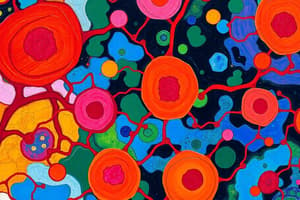Podcast
Questions and Answers
What is the primary role of MHC molecules in the immune response?
What is the primary role of MHC molecules in the immune response?
- To mediate direct pathogen destruction
- To produce antibodies in response to an infection
- To transport glucose across cell membranes
- To present antigen peptides to T cells (correct)
Which type of antigen presenting cells do MHC class II molecules primarily utilize?
Which type of antigen presenting cells do MHC class II molecules primarily utilize?
- Professional antigen presenting cells (correct)
- Only tumor cells
- All types of body cells
- Neutrophils exclusively
Which statement correctly describes MHC class I molecules?
Which statement correctly describes MHC class I molecules?
- They are only found on B cells.
- They present to helper T cells exclusively.
- They are larger than MHC class II molecules.
- They present antigens from intracellular sources. (correct)
What happens to an antigen after it is engulfed by a cell for processing?
What happens to an antigen after it is engulfed by a cell for processing?
How are T cells activated by the antigen-MHC complex?
How are T cells activated by the antigen-MHC complex?
What is the primary function of Major Histocompatibility Complex (MHC)?
What is the primary function of Major Histocompatibility Complex (MHC)?
Which class of MHC molecules is primarily expressed on professional antigen presenting cells?
Which class of MHC molecules is primarily expressed on professional antigen presenting cells?
Which of the following correctly describes MHC Class I molecules?
Which of the following correctly describes MHC Class I molecules?
What are the components of MHC Class II molecules?
What are the components of MHC Class II molecules?
Which statement is true regarding the human leukocyte antigen (HLA)?
Which statement is true regarding the human leukocyte antigen (HLA)?
Flashcards are hidden until you start studying
Study Notes
Antigen Processing and Presentation
- Antigen processing involves capturing and degrading antigens for presentation to T cells via Major Histocompatibility Complex (MHC) molecules.
- T cells require peptide-MHC complexes for recognition, while B cells can bind free antigens directly.
- MHC molecules, encoded by multiple loci, present processed antigen fragments to T cells, pivotal for initiating an immune response.
- MHC class I (HLA class I) is present on all nucleated cells, presenting endogenous peptides to CD8+ T cells.
- MHC class II (HLA class II) is mainly found on professional Antigen Presenting Cells (APCs) like dendritic cells, macrophages, and B cells, presenting exogenous peptides to CD4+ T cells.
Structure and Function of MHC
- MHC class I consists of four domains (α1, α2, α3, and β2-microglobulin) and interacts with CD8+ T cells.
- MHC class II consists of four domains (α1, α2, β1, and β2) and is recognized by CD4+ T cells.
- Human MHC is referred to as Human Leukocyte Antigen (HLA) with two classes: HLA class I and HLA class II, each being polygenic and polymorphic.
Antigen Sources and Presentation Mechanisms
- Endogenous antigens (e.g., viruses, tumors) are modified and presented via MHC class I; they undergo degradation in the cytosol by proteasomes.
- Exogenous antigens (e.g., bacteria) are taken up through endocytosis or phagocytosis, processed in lysosomes, and presented via MHC class II.
- For MHC class I loading, peptides are transported to the endoplasmic reticulum (ER) and bind to MHC class I molecules before transport to the cell surface.
- MHC class II molecules are synthesized in the ER with an invariant chain blocking the peptide groove, replaced by antigen peptides after the chain is cleaved.
MHC Restriction and Immune Response
- T cell recognition is dependent on peptide-MHC complexes; T cell receptors (TCRs) recognize these complexes rather than solitary peptides.
- MHC restriction ensures T cells only respond to self-MHC-displayed peptides, crucial for distinguishing self from non-self.
Clinical Relevance
- MHC compatibility is crucial in organ transplantation; mismatches can lead to rejection.
- Certain MHC genotypes increase the risk of autoimmune diseases such as Type 1 diabetes and rheumatoid arthritis.
- MHC diversity impacts susceptibility to infections and can affect disease outcomes in infections like HIV and malaria.
- Understanding MHC's role in presenting tumor antigens can improve effectiveness in cancer immunotherapy and personalized medicine approaches.
Studying That Suits You
Use AI to generate personalized quizzes and flashcards to suit your learning preferences.




